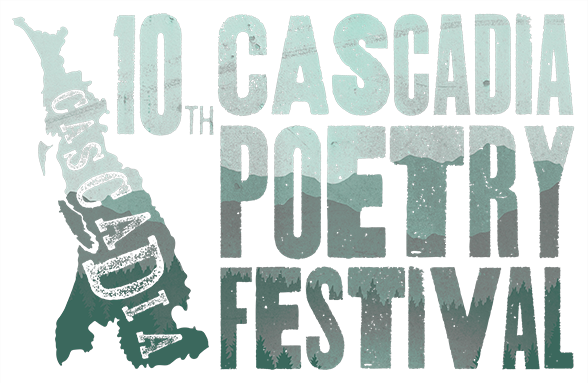2023 Cascadia Poetry Festival 7 – SEATTLE WORKSHOPS

workshop sold out
Stimulating the Satori Moment in Poems
Tess Gallagher
Satori is a Japanese Zen Buddhist term for awakening comprehension: deep understanding. It is derived from the Japanese verb satoru, “to know”. But rather than intending a philosophical concept of knowledge, satori concentrates instead on “acquiring of a new point of view in our dealings with life and the world.” It is another name for reaching Enlightenment. In poetry it means a moment (often culminating moment), when the poem wakes us up, startles us into a new awareness. This class will ask writers to take simple elements such as the moon, water, a bridge—or other sets of catalysts and attempt to stimulate this moment. As example I give my own poem:
Another famous example would be James Wright’s poem “A Blessing” which ends: “Suddenly I realize/That if I stepped out of my body I would break/ Into blossom.” This word “suddenly” is a clue to the effect the satori moment creates. One suddenly is overtaken by a feeling, a conjunction of forces, a lightning strike of transport that breaks open the moment so freshly one can’t ever think the same way again. Please bring and share your satori moment poems if you have already written some, but the real objective will be ultimately to write some fresh poems in this mind and from them to realize in discussion how that moment is taking place.
This workshop is open to Cascadia Poetry Festival 7 Gold Pass holders. It will be conduced Saturday, October 7, 2023, at a time and venue to be announced to workshop registrants.
A special thank you to Empty Bowl for sponsoring the Tess Gallagher workshop.



Writing Across Languages.
Gabriella Gutiérrez y Muhs
We are constantly told that to write in one language, you are betraying your other languages, but that is not so. In this workshop we challenge this notion. Join us if you are ready to write meaningful poetry in at least two languages, or to interject expressions into your poems, that are not in English. This would particularly strengthen writers of Spanish or English who want to translanguage and use all their languages in their written work.
Dr. Gutiérrez y Muhs is a poet and professor in Modern Languages and Women and Gender Studies at Seattle University. She has served as former Director for various programs and been honored with two Chairs. She is a polylingual poet, critic, cultural worker. Gabriella is the author/editor of eight books of poetry, criticism and culture, and multiple articles, encyclopedia entries, opinion pieces. She received her MA and PhD from Stanford University. She is first editor of Presumed Incompetent: The Intersections of Race and Class for Women in Academia, single editor of various other books on Chicana criticism, (University of Arizona Press, Lexington Books). She also authored the published and forthcoming poetry collections: Kneading Words: Amasando palabras: Intersectionality, Gooddesss and Beyond and How Many Indians Can We Be? (Flowersong Press) She is the author of A Most Improbable Life, The Runaway Poems, (Finishing Line Press) and The Plastic Book.
In Xochitl, In Cuícatl, a bilingual poetry anthology of Chicanx/Latinx poetry published in 2021 in Madrid, Spain, including more than 66 poets, and another multigenre Latinx women’s anthology Indomitable/Indomables is also forthcoming this year with San Diego State University Press. Her second volume of Presumed Incompetent: Race, Class, Power and Resistance of Women in Academia, for which she is known for having contributed in changing the climate in academia came out from Colorado University Press, in 2020.
This workshop will conduced Saturday, October 7, 2023.


Bioregional Typography
Robert Bringhurst and Theresa Whitehill
Clearcutting of languages and cultures has been widespread in Cascadia, just like the clearcutting of forests. Even so, this remains a rich and highly varied landscape, geologically, biologically, and linguistically. Cascadian Zen: Bioregional Writings on Cascadia Here and Now is an anthology of pieces written and spoken in English, but many languages and writing systems are present in the text – mostly as placenames, personal names, references, and quotations. This will be a discussion between two poet/typographers: Theresa Whitehill (who designed the anthology) and Robert Bringhurst. It will start with some of the interesting problems that cropped up in setting volume 1 of the anthology and proceed to the wider context of polylingual typography in Cascadia in general.
The date for this talk is Saturday, October 7, 2023 1 PM; the venue will be announced and registrants will receive that information before the event. Cost will be $75.



EcoPoetics
Brenda Hillman, Andrew Schelling, and Jan Zwicky
An interactive talk with each poet digging into their own practice as a way to speak to the vast realm of beings. Brenda calls ecopoetics “worried nature poetry.” What are Ecopoetics in the Anthropocene?
The date for this talk is Saturday, October 7, 2023 3 PM – 4:30 pm
This event is supported in part by Poets & Writers.






